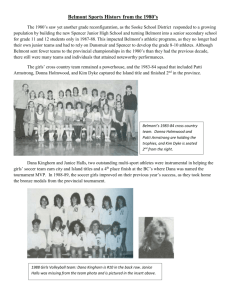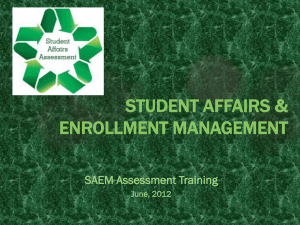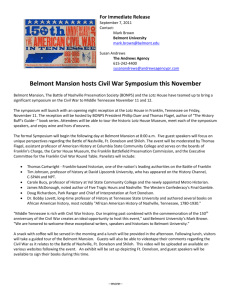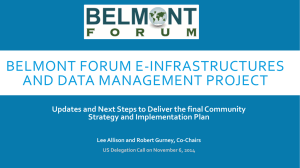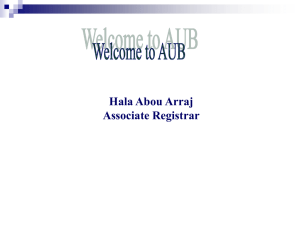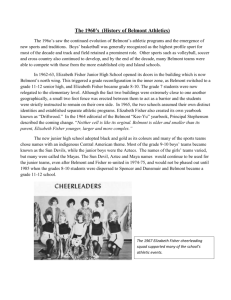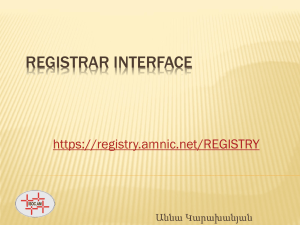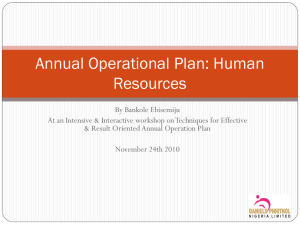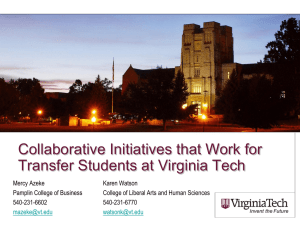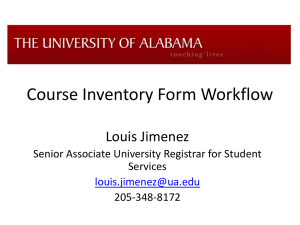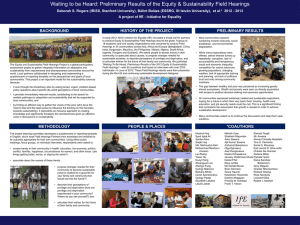M4.2 Planning and Implementing a “Paperless”
advertisement
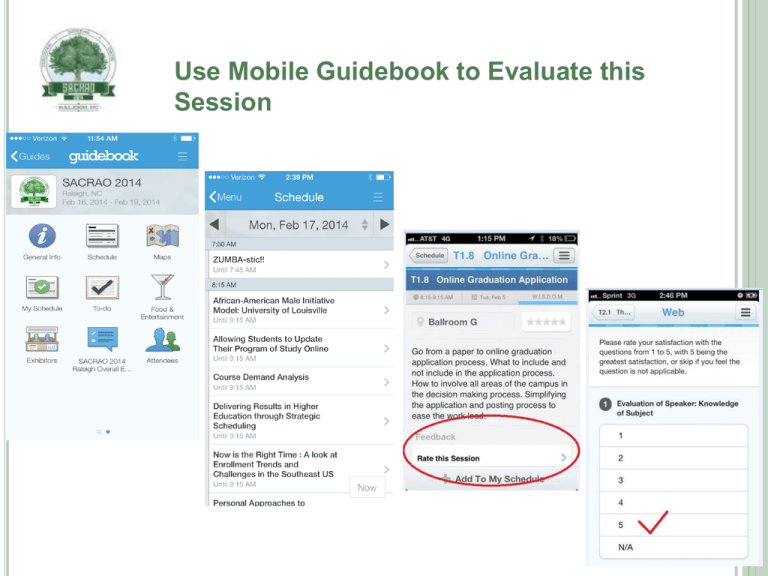
Use Mobile Guidebook to Evaluate this Session PLANNING AND IMPLEMENTING A “PAPERLESS” REGISTRAR’S OFFICE Dr. Steven Reed, University Registrar, Belmont University Ginger Kuechle, Assistant Registrar, Belmont University SACRAO Conference 2014 Session M4.2 THE ELECTRONIC DREAM AND GOING GREEN From This: To This: BELMONT QUICK FACTS Belmont University is a student-centered Christian community providing an academically challenging education that empowers men and women of diverse backgrounds to engage and transform the world with disciplined intelligence, compassion, courage and faith. Located in Nashville, Tennessee Fall 2013 Enrollment: 6,918 Total undergraduates: 5,518 Total graduate students: 1,400 Belmont's Vision To be a leader among teaching universities, bringing together the best of liberal arts and professional education in a Christian community of learning and service. Why is This So Important? • It fits philosophically with Belmont’s desire and initiatives to be a “green” campus. • It puts in practice a global lesson of being environmentally sensitive… And one of those steps is being as paperless as possible. • There is a significant cost savings if you are not buying and processing paper or paying for printing and print cartridges. • Management of documents becomes easier and faster. • Documents can be tracked electronically. Who has them now? • Time savings. Paper, especially most forms, have to be passed, signed, touched, scanned (and/or filed) and often gathered for secure destruction. • Work productivity and efficiency. Paper documents are often sorted and shuffled only to be reprinted and scanned. • Accountability. Electronic tracks who does what and when. • Controlled information access. • Information security. How Does the Green Initiative Fit? “…in the future students will include the university’s transparency and record on sustainability issues as criteria for choosing where they will enroll for their undergraduate and graduate studies.” Newport, D., Chesnes, T., & Lindner, A. (2003). The “environmental sustainability” problem. International Journal of Sustainability in Higher Education, 4, 4, 357-363. “…two-thirds of university applicants say that a school's environmental report card would influence whether they'd enroll.” Sierra Cool Schools: The Third Annual List (2009). http://www.sierraclub.org/sierra/200909/coolschools/ BELMONT GOES GREEN For more than a decade members of the Belmont University community have been doing their part to positively impact the environment and encourage the campus at large to “go green.” From recycling efforts to educational initiatives, Belmont students, faculty and staff have shown their commitment to increasing the university’s environmental sustainability. The green initiative is for Belmont one of several important drivers in our commitment to go as “paperless” as possible. www.belmont.edu/green ENVIRONMENTAL SUSTAINABILITY AND STEWARDSHIP IN HIGHER EDUCATION Universities are in a unique position to be leaders in “going green.” o Rooted locally, networked globally (globally influencing center) o Connection of intellectual and geographical o Open public space for those who attend as well as the surrounding community o Opportunity to set an example o Four C’s: Curriculum, culture, campus, and community o Paper reduction and going paperless is just one part of how universities can set an example of sustainability Higher education is “training the future designers, planners, scientists, politicians, and citizens who will be needed to envision, endorse, and implement sustainable practices.” Thompson, R., & Green, W. (2003). When sustainability is not a priority. International Journal of Sustainability in Higher Education, 6, 1, 7-17. “Higher education can be a participant in the current dialogue that is taking place about how to define and achieve sustainability.” Barlett, P., & Chase, G. (eds.), (2003). Sustainability on Campus: Stories and Strategy for Change. Boston: Massachusetts Institute of Technology. PROGRESSIVE STEPS TAKEN AT BELMONT TO BE PAPERLESS Primary drivers: Environmental initiatives; Streamlining in a significant enrollment growth mode; cost savings; physical space considerations; information protection; work productivity; work smarter before adding staff. Developed as a 10 year plan. • There was a leadership decision in the fall of 2001 to move away from paper processes. Authority was given to the University Registrar for implementation. • Spring of 2002 course schedule booklets were discontinued in favor of a homegrown on-line course schedule tracker in real time (“ClassFinder”). • In the spring of 2002 all Registrar files and records (back to 1960) were scanned and integrated to Banner’s Web X-tender. • June 1, 2002 the university catalog was rolled out onto the web -- 100% electronic / web based. No paper copies were printed. PROGRESSIVE STEPS CONTINUED… • 2003 – 2004 collection and scanning of academic area files; •Stopped printing all ‘triplicate forms’ since single documents would be scanned; •Training for administrative assistants and “new culture” training for faculty • 2005 Implementation of on-line degree audit (DARS). Stopped paper documents printed out of student files (e.g. substitution forms) • 2006 E-mail and “Portal” communication announced as the primary communication tool (some exceptions such as suspension letters). • 2007 Begin to experiment with E-mailing forms from faculty (security side is use through their Belmont account with unique ID number) • 2008 “Retain” (Hobson’s Product) rolled out -- used to target groups via E-mail. • All outside vendor printing of forms discontinued. -- Either electronic communication or can still use on-line PDF is the accepted method. PROGRESSIVE STEPS CONTINUED… • 2009 New Degree Audit software (DegreeWorks) adopted [roll out March 15, 2010] --- Advisor files all online. • 2010 All forms available on line and adapted to be tracked and validated through Microsoft Outlook. --- No paper forms and drag and drop features • 2012 Online Transcript Ordering through National Student Clearinghouse. • 2013 • Banner Graduation Application • Concurrent Enrollment Submissions online through student portal • All graduation related communication sent by email • All notifications sent by email: Dean’s List, Probation/Suspension, Registration Dates and Deadlines. • Upgrade room scheduling software to EMS; scheduling, room requests all done electronically. • 2014 Mobile app in testing phase WHAT’S GONE? • Printed academic catalog • Course schedule books • Mass mailing of letters and notifications CLASS FINDER ONLINE CATALOG BENEFITS OF THE ONLINE CATALOG • Direct entry for update and changes (html) • Instant changes can be published to the web • Tracks changes – person and timestamp • No prohibition by state, federal or accrediting agencies on having an on-line only catalog. • Bi-annual updates. (January for editorial and non-substantive; June for all substantive changes) • Cost saving out of the Registrar’s budget is approximately $1.2 million since 2002 - (does not factor in any cost increase over the past 8 years) • Track usage and movement by end users. Average monthly hits on the catalog: 1,725 • All archived catalog years available for viewing • Stepping stone for online degree audits (DARS to Degree Works) BENEFITS OF CLASS FINDER • Publishes approximately 2-3 months prior to the start of a term (for fall about 5 months in advance) • Refreshes new information every 5 seconds • Cost savings of just under $100,000 since 2002 - (does not factor in any cost increase over the past 8 years) • Average monthly hits in Class Finder: 622,000 (average of 90 hits per student). OTHER WEBSITE HITS JAN 3 – FEB 2 • Transcript page: 1402 page views • Exam-Schedules: 1017 page views • Transfer information: 391 page views • Registrar Forms: 339 page views • Graduation information: 216 page views DOCUMENT IMAGING AND SCANNING Benefits of Document Management: • Banner Web X-Tender • Free up physical space. • Placing staff in positions where they can add value. • Drag and Drop capabilities. • Immediate access to student files from any office with security parameters. • Greatly reduces (eliminates) misplacement of confidential documents. • Documents are safe on a dedicated server. • FERPA requests processed quickly. • Eliminates the “how long do you keep it” policies, since everything is saved. SCANNING PROCESS Transcript Received by Admissions Transcript Received by Registrar’s Office Scanned and stored in Document Imaging Academic Department Admissions Registrar’s Office Advisor Prospective student web link STUDENT COMMUNICATION TOOLS Information and notifications previously sent by regular mail are now distributed to student email addresses. Benefits: Build a strong communication plan with proven content built to drive students to graduation. Streamlined communication with students Increased staff availability to personally interact with students Increase efficiency and track results Maximize budget by doing more with less Target unique populations in unique ways Postage cost savings in what would normally be direct mailings STUDENT COMMUNICATION TOOLS Graduation Communication Notification to apply for graduation Notification of drop, add, and withdrawal dates In Progress: Targeting specific groups such as VA and Athletes Dean’s List notification with link to press release Text Alert System Mobile App DEGREE WORKS AUDIT SOFTWARE DEGREE WORKS AUDIT SOFTWARE DEGREE WORKS Benefits of Degree Works: One page graduation audit as well as progressive audits can be saved in PDF format. PDF files can be emailed to students and advisors as well as “dropped” into student’s document imaging file. Secure online access to degree audits for students and advisors. Real time information. Less paper audits means more security with student academic records. Creates electronic advising file with notes and academic planner. Shared information between all advisors. THE NEXT STEPS: 2014 AND BEYOND Electronic Transcripts Banner Workflow QUESTIONS? Dr. Steven Reed, University Registrar, Belmont University (steven.reed@belmont.edu) Ginger Kuechle, Assistant Registrar, Belmont University (ginger.kuechle@belmont.edu) SACRAO Conference 2014 Session M4.2 Use Mobile Guidebook to Evaluate this Session
